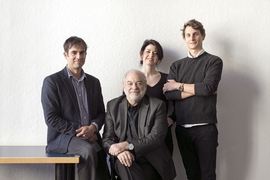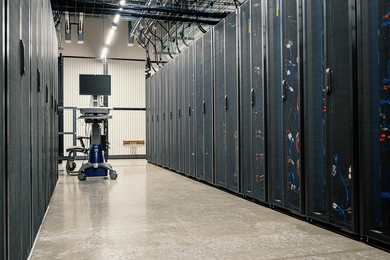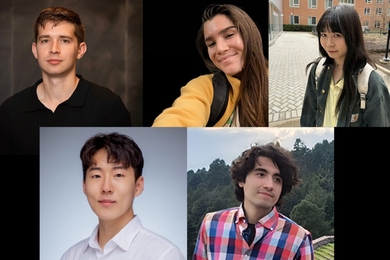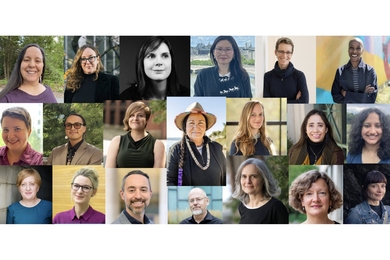What do portable desks for children in developing countries, 3-D models of underutilized Boston real estate, and devices that track opioids in city sewers have in common? They are among the products or services developed by the first cohort of teams participating in DesignX, MIT’s newest innovation accelerator.
Established within the School of Architecture and Planning last fall, DesignX has been working to unleash the capacity of students and recent graduates to create innovative solutions to pressing urban problems.
“Too often in our school, great ideas are left behind at the end of the academic program as students go on to work as planners or junior architects,” says DesignX director Gilad Rosenzweig. “We are providing a bridge to apply some of those ideas to the big problems that all of our cities face.”
Each team chosen for the annual program receives $15,000 along with mentorship from industry entrepreneurs, who guide them through the steps of customer development, product design, and business planning. The first eight teams recently presented their ideas for transforming the built environment at a range of scales during a lively “pitch and demo” event at MIT.
The accelerator began as a collaboration between Rosenzweig; Dennis Frenchman, the Class of 1922 Professor of Urban Design and Planning; MIT Real Estate Innovation Lab Director Andrea Chegut; and urban design doctoral student Matthew Claudel, who came together to infuse the school with a more robust culture of entrepreneurship.
“That culture was always here, but it needed a place to crystallize around,” says Frenchman. “It’s important that we have these efforts that focus not only on the technology but also on the social implications of how we can improve quality of life through design.”
The projects are truly cross-disciplinary, incorporating “everything from how you might develop a space to furniture,” says Frenchman. The full list:
- Biobot Labs, whose pitch at the event garnered the $5,000 audience-choice award, places networks of sensors in city sewers; using DNA sequencing and metabolomics, to the company analyzes and maps the health and wellbeing of a community, with a focus on mitigating the opioid epidemic.
- BitSence uses sensors and data analytics to help people who manage spaces better understand how their spaces are used.
- Hosta is an application that turns pictures and videos of living spaces into a 3-D space management platform that simplifies the home renovation process.
- Kumej is a light, collapsible desk designed to enable underprivileged students in India to carry and create their own comfortable learning surface, typically at the construction site where their parents work.
- Learning Beautiful creates tactile, Montessori-inspired learning materials to teach computational thinking to young children, without the use of computer screens.
- Mediate is a cloud-based system for collaboration in virtual reality by architects, designers, and their clients.
- Nesterly seeks to solve the dual problems of housing affordability and aging-in-place with a platform that allows older homeowners to rent rooms at affordable rates in exchange for tasks around the home.
- Placeful is a platform that integrates design, spatial computation, and real estate development to reveal the untapped capacity of properties across a city.
The varied projects are united in the goal of tackling a real-world problem. “With all of our teams, we are asking how is this really going to make a positive impact,” says Rosenzweig. “There is definitely a bigger collective outcome rather than just a personal outcome for a product or service.”
Unique among innovation accelerators, DesignX has as its core an academic course that gives it structure and rigor, allowing students to earn credit as they are pursuing their entrepreneurial vision. “The mentors were top-notch,” says BitSence’s Ammar El Seed, SM ’16. “They helped us with everything from storytelling to financing to negotiation.”
Many of the students in the program were able to link the project to their thesis, and since DesignX runs for the calendar year, they will be able to benefit from guidance as they launch their ventures post-graduation.
While most of the teams came in with projects already under way, DesignX also spurred ideas that wouldn’t have been developed otherwise. “As a woman, I never felt really invited into the entrepreneurial ecosystem,” says Nesterly’s Noelle Marcus, a master's of city planning (MCP) student. “It gave me the confidence to go out and develop an idea.”
“Many older people feel overwhelmed with keeping up their homes,” says team member and MCP student Dennis Harvey. “At the same time, there is a deeper problem many communities such as Boston face in providing affordable housing for students.”
DesignX enabled the Nesterly team to survey students and retirees to make sure that there was demand for the idea of a platform connecting students and empty nesters, and design the interface in a way that would be useful for both groups.
The company has since received $5,000 from MIT’s Sandbox Innovation Fund and $7,500 from the IDEAS Global Challenge, as well as being a semifinalist in the prestigious $100K Entrepreneurship Competition.
They also won a grand prize in the community resiliency category in the Big Apps NYC competition and were accepted to the MassChallenge startup accelerator. “It’s been this incredible experience for all of us,” Marcus says.











